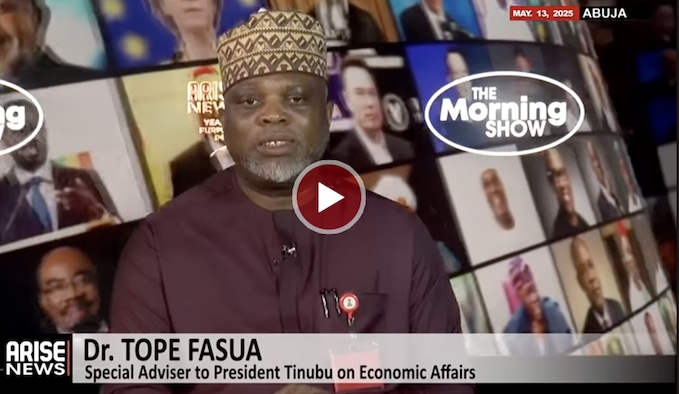BREAKING: Economist Tope Fasua Responds To World Bank, Insists 2025 Budget Goals Are Achievable

Economist and Special Adviser to President Tinubu on Economic Affairs, Dr. Tope Fasua, has defended Nigeria’s ambitious 2025 budget amidst concerns raised by the World Bank, asserting that the budget is a strategic projection into the future aimed at driving hard work and faster progress.
In an interview with ARISE News on Wednesday, Fasua argued that setting high targets is essential for driving growth, emphasising that the budget serves as a strategic projection into the future.
Addressing the World Bank’s concerns that the 2025 budget projections are overly ambitious, Fasua maintained that the administration’s goals are both necessary and achievable. He argued that setting high targets is essential for driving growth.
“It’s left to us to be ambitious… The budget is a projection into the future,” Fasua stated.
Fasua, while defending Nigeria’s 2025 budget, acknowledged that skepticism exists but insisted that producing two million barrels of oil per day is realistic, given ongoing efforts to revitalise both northern and southern oil fields. “Actually, the target is four million. So if we say two million in the first instance, yes, let’s give it a shot,” he asserted.
Addressing concerns over the $800 million World Bank loan aimed at conditional cash transfers, he acknowledged that only 37% of the intended beneficiaries have received funds, primarily due to challenges with biometric verification.
He stressed the importance of monitoring, saying, “Even if 30 percent of 15 million people were reached… the problem I have with that is 4.5 million people aren’t even speaking up.”
The Economist also argued for a more measured approach to avoid repeating past mistakes, stressing that biometric verification is critical for transparency.
On fiscal management, Fasua reported improvements in debt servicing and a reduction in fiscal deficits. He noted that debt servicing, which stood at 120% of revenue in 2022, had now declined to around 65-70%. “From 120 percent… to about 64–70 percent today—this shows substantial progress,” he stated.
He also defended Nigeria’s debt management record, citing the recent repayment of a $3.43 billion IMF loan as evidence of the country’s commitment to its financial obligations. “Nigeria has never defaulted on debt servicing… We have a pristine record,” he said.
Regarding the Naira’s value, Fasua clarified that the Central Bank of Nigeria (CBN) is not defending the currency but rather allowing it to float within market dynamics.
“We’re not defending the Naira as far as I know… the Central Bank is just another player in the market,” he noted, explaining that periodic CBN interventions are part of managing the float rather than pegging the currency.
Amid concerns over financial transparency, Fasua confirmed that a forensic audit of the Nigerian National Petroleum Company Limited (NNPC) is underway to address longstanding issues of financial opacity and revenue remittance.
Further responding to calls for a thorough audit following the World Bank’s critical report, he noted, “There was a mention of that a couple of weeks back, that the forensic audit was afoot… I think this time it will be actioned.”
Fasua noted that the new NNPC management is committed to ensuring financial transparency, aiming to resolve legacy issues and secure a “clean slate” moving forward. “The new management is also interested in inheriting a clean slate… NNPC has been a bit opaque over the years,” he remarked.
According to him, the goal of the audit is not to “witch-hunt” but to establish a clear financial position for the nation.
He stressed that President Tinubu is determined to ensure that “the entire revenues from crude oil sales come back to Nigeria.”
Fasua concluded by reiterating the government’s commitment to economic stability and growth. While acknowledging persistent challenges, he urged Nigerians to adopt a forward-looking mindset. “It’s Nigerians that have to be ambitious with our budget… We are seeing it from a more futuristic, global perspective,” he concluded.
